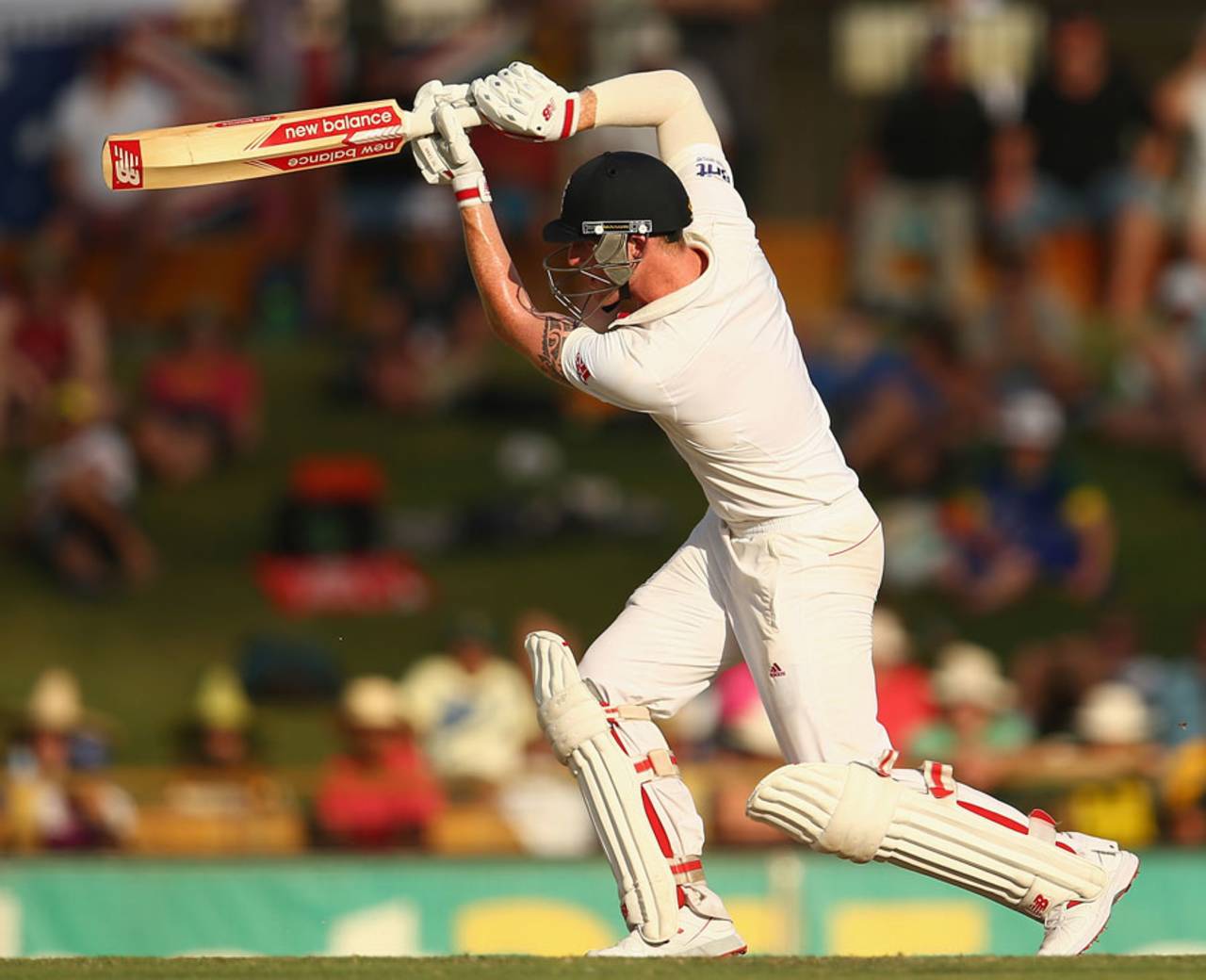Stokes is the future, the rest is dark
There has been no shortage of punditry and vitriol directed at Andy Flower and Co in the wake of the Ashes loss. They have their work cut out for them
Jon Hotten
Jan 8, 2014, 3:29 AM

Stokes could well be the England side's next pivot, after Graeme Swann • Getty Images
"I wouldn't walk around the corner to see United."
George Best said that, when his former club had a new manager who was struggling in his job. Best also recommended replacing that manager with Terry Venables. The manager was Alex Ferguson, who didn't win a trophy with Manchester United until his fourth year in charge, and then went on to win a few more - 39 in total.
Best's criticism did not exist in isolation, and it's not quoted here to diminish him (I interviewed him once, in a pub in London; it was funny and sad) but rather to highlight the unknowability of sport. After all, it's why we like it, isn't it? Because we don't know what's going to happen. And if one of the greatest footballers of all time cannot recognise one of the greatest managers, then who can really know anything?
Football and cricket were once quite distinct in the cultures that surrounded them. Football is the ultimate in short-term sports, the beast that feeds on itself. David Moyes, the man who replaced Sir Alex Ferguson, is the 11th longest-serving manager in a Premier League of 20 clubs. He's been in the job for 189 days. Outside of the sport's internal dynamics, there is an almighty clamour of voices that surround it, from former pros, pundits, agents, journalists, television, radio and fans. The demand for change, for something to be done, is constant.
Cricket has always been a more reflective sport, attuned to deeper rhythms. Yet the voices that surround it are becoming amplified, the clamour is growing. And there's nothing like a failure to bring them to the party. Great chunks of it are justified, some of those chunks are insightful, funny, expert, ruminative and rueful and more. They add to a love and enjoyment of the game.
But another great chunk says more about the critic than their subject. Around England's defeat the noise became deafening. It's understandable at times like these why Andy Flower is so guarded and careful, however frustrating that may seem, and however unfavourably it contrasts him with the blessed Boof (it's worth remembering, though, that Flower's output still makes him sound like Brian Clough compared to the unapproachable monolith that was Duncan Fletcher).
The dismantling of Flower's England has been rapid and complete, and if you believe what you read and hear, everyone except Flower saw it coming. The list of solutions is long and varied, and involves sacking everybody. Somehow through this, Flower must plot a course. He has had one great piece of luck that the many ranting voices haven't given much airtime to, and that is a new way of constructing his team.
Flower's era - perhaps after 2015 we'll be calling it his first - was reliant on Graeme Swann. He was the team's pivot point, the player who allowed everything else to happen, the man whose skills, varied and consistent, let Flower play six specialist batsmen and just four bowlers. The stats say that Swann along with James Anderson bowled more balls in Test cricket than anyone else in the period between the 2010-11 Ashes and these - it's not hard to see why his body finally gave out. (And Anderson showed worrying signs of the same. It's the fault of the schedulers, not the players or the coach.)
Ben Stokes, as every pundit has pointed out, is the tour's one highlight for England. But he's a lot more than that. Within Stokes, Flower sees the glimmer of a different future. It's not a spinner who will replace Graeme Swann. England will need to find a twirlyman for sure, but Stokes will be the selection that allows Flower the leeway to build a new side.
It's a finely balanced calibration though. The role Stokes has at the moment, where he bats at six, puts strain on both of his primary skills. England's top order doesn't yet fit together, and it will have to in order to carry a player likely to average in the mid-30s. Equally, Stokes cannot, like Andrew Flintoff ultimately did, bear much of the weight of the bowling attack, because the schedule will finish him.
For decades England have laboured under the illusion created by the indestructible Botham that an allrounder is a magical solution to all problems. Botham was a once-in-a-lifetime cricketer, a physical freak upon whom the psychological pressures of the game had little hold.
Flower's ideal might be that Matt Prior finds a Haddin-style resurrection. He is certainly good enough to bat at six, and allow Stokes to grow into his pivotal existence at seven, with three more seamers below him to share the load. That might point the way to a future in which Stokes can flourish rather than be crushed by work and expectation.
Flower would be justified in pointing out that Australia beat England with a demon fast bowler and a keeper-batsman who had both been written off three years ago, plus a 36-year-old county warhorse at the top of the order alongside a bad boy who was chucked out of the team last summer. They have a No. 3 with a Test average of 36, and a No. 6 with a highest score of 53.
Sometimes circumstance just fits. All of the voices screaming at England should remember that luck and circumstance sometimes coalesce for no real reason. The future will unfold around Stokes. Beyond that, who really knows?